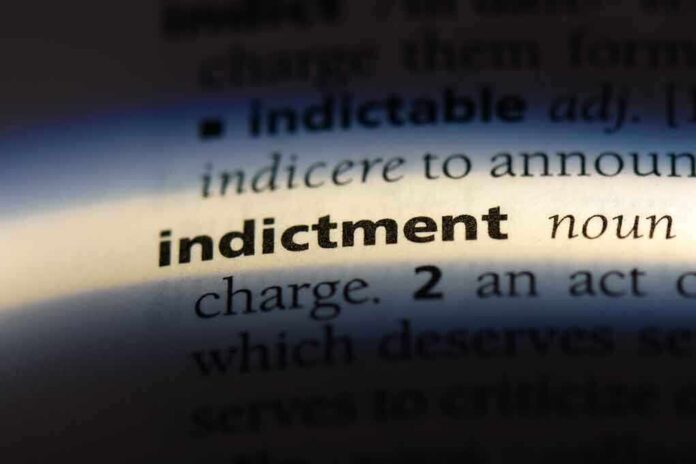For the first time, a former FBI Director faces criminal charges for allegedly lying to Congress and obstructing justice—raising urgent questions about government accountability and the politicization of law enforcement.
Story Highlights
- James Comey indicted on two felony counts tied to his 2020 congressional testimony about the Russia probe
- Indictment follows years of public pressure from President Trump and his allies to hold officials accountable for the “Russia hoax”
- Prosecution sparks fierce debate over DOJ independence and the precedent of charging senior former officials
- Legal and political experts warn of escalating political retribution and deepening public distrust in impartial justice
Comey Faces Historic Indictment After Years of Public Outcry
On September 25, 2025, former FBI Director James Comey was indicted by a federal grand jury on two felony counts: making a false statement to Congress and obstruction of a congressional proceeding. This marks the first-ever prosecution of a senior government official tied to the Russia investigation, a probe many conservatives have long viewed as a politically motivated attack on President Trump and his supporters. For years, Trump and his allies have demanded accountability for what they called the “Russia hoax,” and this indictment is widely seen as the result of sustained public pressure from the White House and conservative grassroots.
Comey’s indictment stems from his September 2020 testimony before Congress about the FBI’s “Crossfire Hurricane” investigation into alleged Russian interference in the 2016 election. Despite multiple government reviews confirming some level of Russian meddling, Trump and many on the right have consistently called the investigation baseless, asserting it was weaponized by political operatives to undermine the will of American voters. The charges allege Comey misled lawmakers about his handling of the probe, fueling outrage among Americans who have watched years of unchecked bureaucratic overreach and partisan double standards erode faith in the system.
Political Pressure and the Weaponization of Justice
The prosecution comes amid direct public pressure from President Trump, who, in late September, urged Attorney General Pam Bondi to take action against Comey. Bondi, a well-known Trump loyalist, now oversees the Justice Department and has pledged to restore accountability after years of perceived abuses. Kash Patel, the current FBI Director, echoed these sentiments, stating the agency is committed to “full accountability.” Critics, however, claim the case is politically motivated, citing concerns about the growing influence of the White House over DOJ operations and the erosion of longstanding norms meant to shield law enforcement from partisan interference. This development raises alarms about a potential cycle of political retaliation targeting former officials whenever power changes hands.
The indictment also highlights the complex power dynamics at play. Trump’s influence over DOJ operations, Bondi’s loyalty, and the broader campaign to punish those involved in the Russia investigation underscore the stakes for anyone willing to challenge entrenched bureaucratic interests. With Comey set to surrender in Alexandria, Virginia, on September 26 and an arraignment scheduled for October 9, the stage is set for a high-profile legal showdown that could reverberate throughout American institutions.
Impact on Justice, Rule of Law, and Public Trust
Legal scholars and former DOJ officials are divided on the case’s implications. Some say it is overdue accountability for abuses of power at the highest levels of government—an essential step in restoring public confidence after years of perceived double standards. Others warn it may set a dangerous precedent, undermining the independence of the Justice Department and encouraging future administrations to target political opponents through the courts. The short-term effect is already clear: the case has intensified partisan conflict and further polarized debates about the legitimacy of the Russia investigation and the impartiality of federal law enforcement.
Long-term, this prosecution could chill cooperation with congressional oversight and make senior officials wary of testifying openly before Congress. It risks deepening public cynicism about whether justice is truly blind or merely another tool in partisan warfare. For conservatives who have watched years of unchecked government power, this moment is both a vindication of demands for accountability and a stark reminder that the fight for constitutional principles and honest government is far from over.
Broader Precedent and the Future of Accountability
With Comey’s indictment, Americans are witnessing the unprecedented: a senior official charged for actions tied to a politically explosive investigation that defined a decade of controversy. The case will test not only the limits of prosecutorial independence but also the nation’s commitment to constitutional norms and the rule of law. As legal proceedings unfold, the country faces hard questions about whether real accountability is possible in a system so deeply divided by politics, and whether this moment will mark a turning point—or simply the latest episode in an escalating cycle of retribution.
Sources:
Comey indicted for alleged false statement, obstruction of justice — Fox News Digital
Ex-FBI Director James Comey indicted on charges of lying to Congress and obstruction — KSAT/AP
Ex-FBI Director James Comey indicted on charges of lying to Congress and obstruction — OPB
Ex-FBI Director James Comey charged with making false statement, obstruction, AP source says — WTOP











